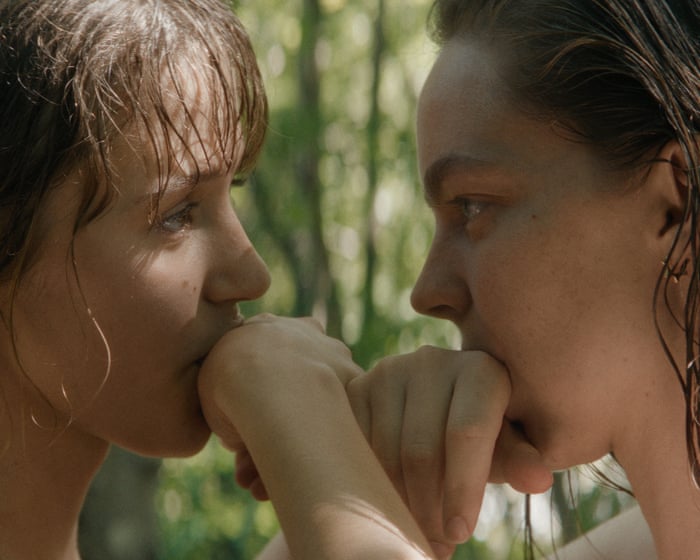Elegantní a tajemný debutový film slovinské režisérky Uršky Djukićové vdechuje nový život známému tématu sexuálního probuzení katolické dívky, umocněn skvělou hudbou a zvukovým designem. Zároveň připomíná – pokud by to někdo potřeboval – že žádný učitel nemůže být tak krutý a zneužívající jako učitel hudby. Už jsme viděli děsivé příklady, jako byl jazzový instruktor JK Simmonse ve filmu Whiplash nebo nemilosrdná učitelka klavíru Isabelle Huppertové ve snímku Klavíristka. Nyní se k nim připojuje slovinský herec a hudebník Saša Tabakovič v roli náročného, ale zlověstného sbormistra, který dohlíží na skupinu talentovaných a zranitelných dospívajících dívek. Film jasně varuje každého mladého diváka: pokud vás učitel hudby požádá, abyste s ním seděli sami u klavíru a zašeptá „Můžeš se mi svěřit“, neposlouchejte ho.
Anglický název Little Trouble Girl je vypůjčen od skupiny Sonic Youth, ale samotný film je prodchnut duchovní hudbou. (Původní slovinský název Kaj Ti Je Deklica znamená „Co je s tebou, holka?“). Příběh sleduje šestnáctiletou Luciju (v podání nováčka Jary Sofije Ostan), plachou členku dívčího sboru katolické školy. Spolu se svou odvážnou a nevyzpytatelnou nejlepší přítelkyní Ana-Marijou (Mina Švajger) se připojí k sborovému výletu přes italské hranice do Cividale del Friuli nedaleko Terstu. Ubytují se v klidném klášteře s nádvořím, kde roste olivovník – poetické útočiště pro Luciju během neklidných nocí.
Sbormistr je stále více frustrovaný, když stavební hluk narušuje zkoušky, a jeho nálada temní. Mezitím dívky pokradmu pozorují nahé dělníky a špehují je při plavání. Noční hry jako točení lahve nebo pravda nebo důl přidávají na napětí. Sborové sekvence jsou okouzlující a pečlivý proces zkoušení – rozebírání a znovuskládání hudby – je strhující. Tabakovičův sbormistr je brilantní, ale náročný, jeho přirozená hudební přísnost skrývá něco mnohem znepokojivějšího. Zvukový design vyniká ve scénách, kde se dýchací cvičení dívek proměňují v podivně téměř smyslný sborový výkon.
V jednu chvíli se Lucija a Ana-Marija ptají laskavé jeptišky sestry Magdy (Saša Pavček) na život bez fyzických rozkoší. Vysvětluje, že naplnění přichází přesměrováním těchto touh do oddanosti Kristu. Ale je to to, co se děje s jejich hudbou? Naznačuje film, že jejich sexuální vývoj je potlačován a přesměrováván do náboženského vyjádření? Nebo je sexualita jen nezralou náhražkou za čistotu hudby?
Příběh nabírá temný obrat, když sbormistr tlačí na Luciju, aby se mu svěřila, což vede k okamžiku zdrcujícího zklamání. Následuje tajemný epilog, naznačující další kapitolu Lucijina života.
Little Trouble Girl je okouzlující, brilantně zahraný film, který vás neopustí ani po doznění poslední noty. Měl premiéru na Edinburském filmovém festivalu.
ČASTÉ DOTAZY
### **Časté dotazy k filmu *Little Trouble Girl***
#### **Obecné otázky**
**1. O čem je *Little Trouble Girl*?**
*Little Trouble Girl* je příběh dospívání zasazený do katolického prostředí, kde zlověstný sbormistr narušuje životy mladých dívek, přidávající temný zvrat k jejich krásné, ale znepokojivé cestě.
**2. Kdo je autorem *Little Trouble Girl*?**
Jméno autora není v recenzi specifikováno, ale jedná se o fiktivní nebo literární dílo.
**3. Je tento film založen na skutečném příběhu?**
Recenze nepotvrzuje, zda je založen na skutečných událostech, ale představuje fiktivní příběh s temnými, realistickými tématy.
---
#### **Témata a obsah**
**4. Jaká jsou hlavní témata *Little Trouble Girl*?**
Příběh zkoumá nevinnost, zkaženost, náboženství a ztrátu dětství, se zaměřením na to, jak autoritativní postavy mohou manipulovat zranitelnými jedinci.
**5. Je *Little Trouble Girl* horor?**
Ne striktně horor, ale obsahuje znepokojivé a temné prvky, které vytvářejí psychologické napětí.
**6. Jak katolické prostředí ovlivňuje příběh?**
Katolické pozadí přidává témata viny, čistoty a zneužívání moci v rámci náboženské instituce.
---
#### **Postavy a děj**
**7. Kdo je hlavní zápornou postavou v *Little Trouble Girl*?**
Sbormistr slouží jako hlavní antagonista, využívající svou pozici k manipulaci a znepokojování dívek.
**8. Jsou mladé dívky v příběhu plnohodnotně rozvinuté postavy?**
Ano, recenze naznačuje, že jsou dobře napsané, s individuálními osobnostmi a problémy, které činí jejich zážitky působivými.
**9. Má příběh nadějný nebo tragický konec?**
Recenze naznačuje temný, možná nedořešený konec, který odpovídá pochmurnému tónu příběhu.
---
#### **Doporučení pro diváky**
**10. Je *Little Trouble Girl* vhodný pro mladé diváky?**
Ne, kvůli temným tématům zahrnujícím manipulaci a psychickou tíseň je vhodnější pro dospělé publikum.
**11. Jaký typ diváka by si tento film užil?**
Fanoušci psychologických dramat, příběhů o dospívání s temnými zvraty a vyprávění o institucionální zkaženosti.
**12. Jsou u tohoto filmu nějaká varování?**
Ano, možná varování zahrnují zneužívání moci, psychickou manipulaci a znepokojivé situace.



